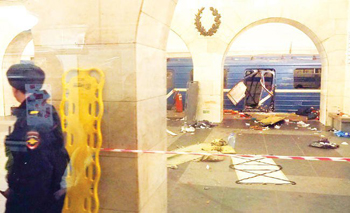Jeddah, Apr 4: Saudi Arabia condemned a suspected terror attack that killed 11 people and injured dozens more when an explosion tore through a train carriage in a St. Petersburg metro tunnel on Monday.
 Russian news media reported that police were searching for a man recorded on surveillance cameras who was thought to have been involved in the attack, which coincided with a visit to the city by President Vladimir Putin.
Russian news media reported that police were searching for a man recorded on surveillance cameras who was thought to have been involved in the attack, which coincided with a visit to the city by President Vladimir Putin.
A source in the Saudi Foreign Ministry strongly condemned the bombing. The source offered condolences to the families of the victims, the Russian government and the Russian people, and wished the injured a speedy recovery.
The Jeddah-based Organization of Islamic Cooperation (OIC) also condemned the blast and offered condolences to the victims’ families and wished the injured recovery.
Yousef Al-Othaimeen, OIC secretary-general, denounced the criminal act that targeted innocent people and reiterated the OIC’s principled position condemning all acts of terrorism.
He stressed the Islamic bloc’s determination to continue working with the international community to contain terror.
US President Donald Trump called the explosion a “terrible thing.” He told reporters that it was a “terrible thing — happening all over the world — absolutely a terrible thing.”
German Foreign Minister Sigmar Gabriel said he learned of the blast “with deep sorrow.” Gabriel said it appeared to be “a perfidious attack against innocent people.”
EU foreign policy chief Federica Mogherini wrote on Twitter she was following developments “together with all EU foreign ministers” gathered for a meeting in Luxembourg. “Our thoughts are with all the people of Russia,” she wrote.
A grainy photograph published by the Fontanka news outlet showed a middle-aged man with a beard and black hat.
Interfax news agency cited unnamed sources as saying the bomb, packed with shrapnel, may have been hidden in a train carriage inside a briefcase.
Russia’s National Anti-Terrorist Committee said an explosive device had been found at a different metro station, hidden under a fire extinguisher, but had been made safe.
The Investigative Committee, a state body that probes major crimes, opened a criminal case on charges of terrorism.
Soon after the 2:40 p.m. blast ambulances and fire engines descended on the concrete-and-glass Sennaya Ploshchad metro station as a helicopter hovered overhead.
Video from the scene showed injured people lying bleeding on a platform, some being treated by emergency services and fellow passengers. Others ran away from the platform amid clouds of smoke, some screaming or holding their hands to their faces.
A huge hole was blown open in the side of a carriage with metal wreckage strewn across the platform. Passengers were seen hammering at the windows of one closed carriage.
Authorities closed all St. Petersburg metro stations.






Comments
Add new comment